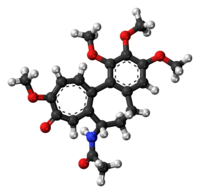Colchicine
 |
|
 |
|
| Clinical data | |
|---|---|
| Trade names | Colcrys |
| AHFS/Drugs.com | Monograph |
| MedlinePlus | a682711 |
| Pregnancy category |
|
| Routes of administration |
Oral |
| ATC code | M04AC01 (WHO) |
| Legal status | |
| Legal status | |
| Pharmacokinetic data | |
| Bioavailability | 45% |
| Protein binding | 35-44% |
| Metabolism | Metabolism, partly by CYP3A4 |
| Biological half-life | 26.6-31.2 hours |
| Excretion | Faeces (65%) |
| Identifiers | |
|
|
| CAS Number |
64-86-8 |
| PubChem (CID) | 6167 |
| IUPHAR/BPS | 2367 |
| DrugBank |
DB01394 |
| ChemSpider |
5933 |
| UNII |
SML2Y3J35T |
| KEGG |
D00570 |
| ChEBI |
CHEBI:27882 |
| ChEMBL |
CHEMBL107 |
| ECHA InfoCard | 100.000.544 |
| Chemical and physical data | |
| Formula | C22H25NO6 |
| Molar mass | 399.437 |
| 3D model (Jmol) | Interactive image |
|
|
|
|
Colchicine is a medication most commonly used to treat gout. It is a toxic natural product and secondary metabolite, originally extracted from plants of the genus Colchicum (autumn crocus, Colchicum autumnale, also known as "meadow saffron").
Adverse effects are primarily gastrointestinal upset at high doses. In addition to gout, colchicine is used to treat familial Mediterranean fever, pericarditis and Behçet's disease.
Colchicine is an alternative for those unable to tolerate NSAIDs in gout. At high doses, side effects (primarily gastrointestinal upset) limit its use. At lower doses, which are still effective, it is well tolerated.
Colchicine is also used as an anti-inflammatory agent for long-term treatment of Behçet's disease. It appears to have limited effect in relapsing polychondritis, as it may only be useful for the treatment of chondritis and mild skin symptoms.
Colchicine is also used in addition to other therapy in the treatment of pericarditis.
Colchicine is used widely in the treatment of familial Mediterranean fever, in which it reduces attacks and the long-term risk of amyloidosis.
It has been studied for the prevention of postoperative complications after heart surgery. Occurrence of atrial fibrillation can be reduced by a third. It has also been investigated in the prevention and treatment of postpericardiotomy syndrome.
Long-term (prophylactic) regimens of oral colchicine are absolutely contraindicated in patients with advanced renal failure (including those on dialysis). About 10-20 percent of a colchicine dose is excreted unchanged by the kidneys; it is not removed by hemodialysis. Cumulative toxicity is a high probability in this clinical setting, and a severe neuromyopathy may result. The presentation includes a progressive onset of proximal weakness, elevated creatine kinase, and sensorimotor polyneuropathy. Colchicine toxicity can be potentiated by the concomitant use of cholesterol-lowering drugs (statins, fibrates). This neuromuscular condition can be irreversible (even after drug discontinuation). Accompanying dementia has been noted in advanced cases. It may culminate in hypercapnic respiratory failure and death.
...
Wikipedia
